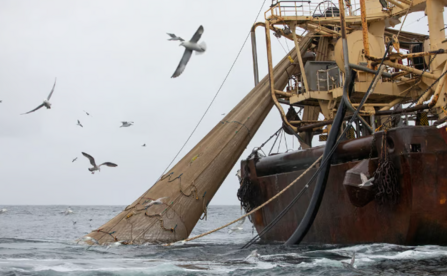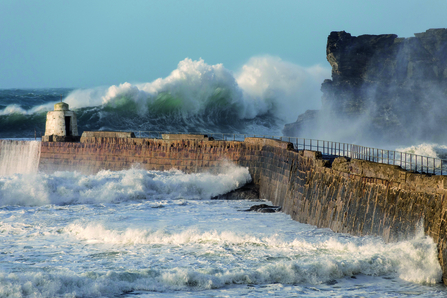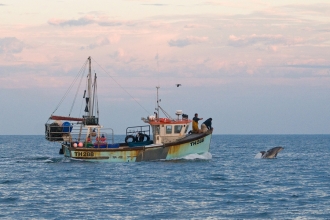Ocean Emergency Fund
Can you help save Cornwall's seas?
Cornwall’s coast is home to some of the richest marine wildlife, from tiny rare colourful corals to bottlenose dolphins and giant basking sharks. However, this diverse marine life urgently needs protecting. Cornwall’s coastal waters face a number of significant pressures – including shipping, development, dredging, and fishing – which threaten our seas and the marine life within them.
Pollution
Pollution is a very serious threat to marine life in Cornish coastal waters. The ingestion of, or entanglement with, plastic and other non-decomposable waste can cause malnutrition, injury or death to marine animals. In 2019, 80,000kg of rubbish was removed from Cornish beaches, whilst in the same year 104 seals were recorded to have been entangled in litter.

Overfishing
While it is possible for fishing to thrive within a healthy marine ecosystem in Cornwall, overfishing has seriously affected many species found in Cornish waters. In 2020, 69%% of fish landed was recommended as being sustainable according to the Cornwall Good Seafood Guide, which is positive, but there is still a long way to go. In addition, certain fishing practices, such as dredging and bottom trawling, have led to the loss of important habitats and animals. Fishing also causes death and injury to marine mammals and birds: in 2019, over 27% of reported strandings showed signs of bycatch (being caught unintentionally by fishing).

Climate change
The effects of climate change are also being felt in the seas around Cornwall’s coast. In the last 34 years, Cornwall’s mean temperature has increased by nearly 1ºC, with another 1ºC estimated by 2050. This is leading to a rise in the seas in the South West, with Cornwall’s maritime environment having seen an average of 0.6 ºC increase in average temperatures since the 1940s. Such a rise in temperatures increases acidification, causing species which rely on calcium for their protective structures (such as oysters, scallops and coldwater corals) to suffer or die out. Sea level rises lead to the loss of coastal habitats and wildlife, for example, intertidal habitats and the species they support.
But there is hope...
Every day, Cornwall Wildlife Trust staff and volunteers work tirelessly to safeguard marine life. The Ocean Emergency Fund enables crucial marine projects, from monitoring marine ecosystems to raising awareness of threats and advocating for stronger protections. With your support, we can create a healthier, more resilient future for Cornwall’s seas.
Your donation to the Ocean Emergency Fund directly supports the protection of Cornwall’s incredible marine environment. By funding vital conservation efforts, you help reduce the threats facing our seas and ensure they thrive for generations to come.
Ocean Emergency Fund
Your donation will support vital marine projects
The Marine Strandings Network records and monitors marine wildlife strandings, and helps train and support a team of over 150 volunteers. The dedicated Strandings Hotline records all reported strandings on Cornwall’s coastline and this information is vital in helping us to conserve wildlife.
The Your Shore Network of Local Marine Groups champion ocean conservation in 17 community-led groups across Cornwall. They work together, sharing data, ideas, and resources to present a united voice advocating better protection for our coast. They also run surveys, beach cleans, and train volunteers to take part in Cornwall Wildlife Trust’s citizen science projects, providing evidence of the threats to our valuable marine life and the need for better protection.
The Cornwall Good Seafood Guide, works with the fishing industry to increase sustainable practices, whilst increasing awareness of sustainably sourced fish amongst consumers.
Your donation will make a real difference in protecting marine life, restoring habitats, and tackling the urgent threats our oceans face. With your help, we can continue our vital work to safeguard the future of our seas. On behalf of our team and the marine life you’re helping to protect — thank you.Dan Barrios-O'NeillHead of Marine Conservation








